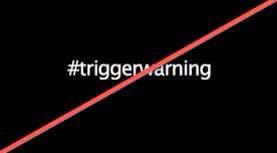So, it’s been quite a long time since I posted a blog here. As many of you know, I had a baby. I bought a house. I (re)started graduate school. And with all that going on, it’s been a struggle to keep up with the usual stuff–work, family, my own self-care, and the many other things that are important to me. I would love to promise that I’ll post an update soon, but it’s not realistic for me right now. So, I’ve got a few awesome guest bloggers lined up. I can’t wait to share what they have to say, as these ladies are truly amazing.
Today’s guest blog post is written by a great and wise fellow friend in recovery, Amy Louise Kinman. She’s going to discuss the role of triggers in recovery. What can we say about triggers that hasn’t already been said before? Read on to find out.
Have you ever heard the saying “What you resist will persist”? How about Newton’s 3rd Law of Motion: “Every action has an equal and opposite reaction”? When it comes to eating disorders, trauma, and some other mental health conditions, I believe both of these to be true about a little something called “triggers.” Allow me to explain.
about a little something called “triggers.” Allow me to explain.
People with eating disorders often talk about trigger foods, triggering events, and triggering people. Labeling things as “triggering” like this gives these things far too much power over us! These things we call “triggering” set us off only because of the thoughts we have related to them. That’s right. It’s our own mind allowing these things to be problems for us! The more we avoid these things, the more we are potentially perpetuating the issue. I’m not saying, for example, that a person with the fear of snakes should be thrown into a pit of rattlers in order to get over their phobia, but perhaps visit a zoo or a friend who owns a snake. Do some research about snakes. Get to know them, slowly. Each time the snake-phobic person confronts the fear, it will have that much less power over them. Each time a fear is confronted, it’s an opportunity to understand the thoughts behind the fear and implement a healthy coping mechanism when necessary.
Raw “triggering” moments can be the perfect time to tune into your thoughts and feelings and intervene with a healthy coping mechanism (or two). When you are feeling particularly “triggered” by something, take a timeout and scan your body and mind: Notice your thoughts. Are you thinking about what *could* happen, rather than what is happening or what you need in this moment? Notice the feelings that proceed the thoughts. Do you have any sensations in your body? How strong are they? What is it about this “trigger” that has such a high charge?
Instead of trying to resist or deny your thoughts and feelings, use your energy wisely—redirect it. Determine your true needs and what kind of healthy move you can make in order to take care of yourself: Am I tired? Am I hungry or thirsty? Do I need to move my body? Do I need to call a friend to vent about my frustrating day? In what other way can I provide myself some comfort in a healthy way? Is meditation appropriate right now? (It always is, if you ask me!)
One of my favorite tools is Emotional Freedom Techniques (EFT, Acupoint Meridian Tapping, Emotional Acupressure, etc.). EFT is an excellent mind-body connection technique that combines acupressure stimulation and psychological stimulation simultaneously. It’s one of my favorite tools to reduce chronic fear and anxiety in addition to dealing with them in the moment. There are so many ways to soothe ourselves. Explore and experiment. Find what works for you. Because anything in the entire world is a potential “trigger,” taking away the power that people, places and things have over you is a great place to start. We can’t avoid the world. There are so many truly wonderful and beautiful things we would miss out on if we did.
Use “triggers” to get to know yourself and your needs, and start to trigger some happiness!
![]()
(c) Hungry for Recovery – Read entire story here.